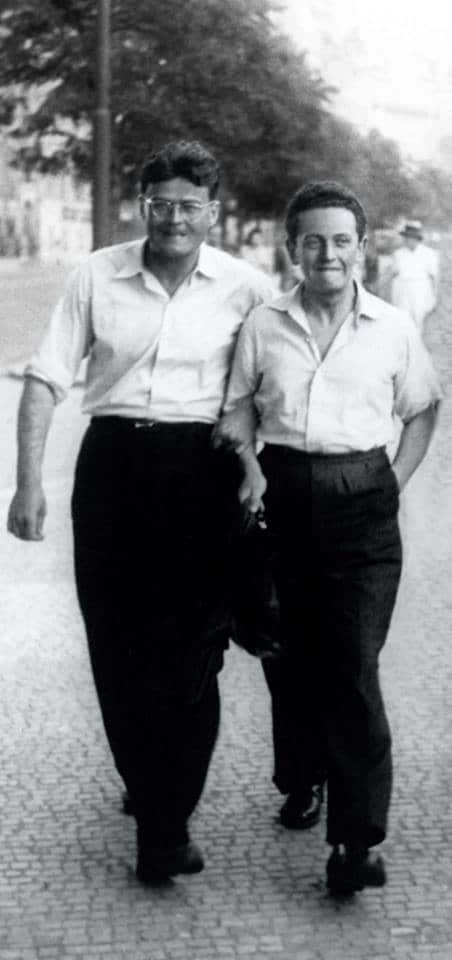The musician who saved Elie Wiesel from certain death
mainA memoir by the Czech-born composer Alexander Goldscheider:
Elise Wiesel died yesterday and I shall leave to others to disseminate and fully appreciate his unique legacy.
But hardly anybody will know that Elie Wiesel would have died already back in 1945, had he not been, like so many others, saved from being sent to death in Buchenwald by a Czech co-prisoner, Jiří Žák.
Jiží Žák, a journalist, writer, jazzman and forever a prankster, grew up with my dad in Pilsen. I can think of a dozen great stories from the life of this larger-than-life character, but I shall restrict myself to his remarkable role in Buchenwald, where he was imprisoned throughout World War II as a Trotskyist. Not only did he manage to survive, he started a jazz band there and, above all, worked in an office as a copyist – lucky for him as for many others…
I knew and admired him since I was a child, he was like closest family that I never had, as I lost it in other camps. He introduced me to jazz and involved me in many of his pranks, let me read forbidden books and many a time offered me his binoculars to watch a young lady living across a courtyard, who liked to appear naked by her window.
He emanated such power, had such integrity, ever present sense of humour and vast and varied experience with women which he was always ready to share with me. I knew there were dark moments in his life, too, but I learned well from home not to ever bring up the camps, and in his case the persecution in the 1950’s as well.
When I first travelled to the West, to France in 1967, he took his business card, tore it in halves and instructed me to hand one to a lady working at the Eiffel Tower and the other to a man in a restaurant not far from it. They will know what to do, he added.
The Frenchman in the restaurant asked me how I happen to know Jirka, how he was, was there anything he could do for me, would I care to choose from the menu or would I leave it up to him, and soon one plate after another started landing on my table. An hour later I was in panic knowing that all of my money would not be enough. Two hours later it no longer mattered. I probably never ate so much and so well. The gentle, somewhat mysterious Frenchman next asked me, whether I already visited the Tour Eiffel? I must see his wife, she will let me in and take care of me, and I am more than welcome to come to, as it turned out, his restaurant again and again, and eat as much as I like, always his treat, of course. Overwhelmed by the food and knowledge there would no bill, I just wondered how I deserved it, what sort of connection, deal was there between him and Jirka Žák?
A deal, he laughed! Jirka never told you, did he? If it was not for Jirka, I would not be here, nor would my nowadays extended family, the restaurant and so much else! Jirka saved my life and so many others, he continued, and tearfully explained that Jirka with admirable bravery systematically managed to ignore instructions and omit as many names as he could from being added to the book of those condemned to death and add them to the book of life, so to say.
Elie Wiesel, a pitiful 16-year Romanian, was one of those names.
When Wiesel came to Prague at the invitation of President Havel half-a-century later, Jiří Žák was the first he wished to find and contact. Given a telephone number, he could only speak and thank Jiří’s wonderful wife Jarmila: Jiří Žák died 29. 1. 1986, 68 years old and miserable as an émigré in Hamburg.
I am admittedly so glad that I can share this story, albeit on such a sad day.
Jiří Žák is pictured here (left) with my dad, probably around 1950.

(c) Alexander Goldscheider





Comments